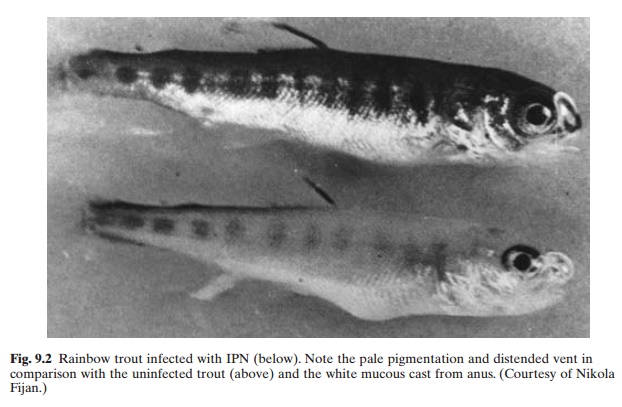Chapter: Aquaculture Principles and Practices: Health and Diseases
Infectious pancreatic necrosis (IPN) - Viral diseases of aquaculture species
Infectious pancreatic necrosis (IPN)
Infectious pancreatic necrosis is primarily a viral infection of trout and salmon, but the virus has also been isolated from a number of other fish species, including eels. IPN-like viruses have been isolated from common carp and several species of bivalve molluscs from coastal waters. It is a major fish disease problem in North America and Europe and has been found also in Japan. It occurs as an acute disease in fry and fingerlings of trout. Culture technologies and management practices can affect the severity of disease outbreaks. When the mortality rate is high, infected individuals swim in a rotating manner about their long axis. This whirling behaviour is a terminal sign and death occurs within an hour or two. Prior to this stage, the affected individuals may remain on the bottom, showing weak respiration and convulsive movements. It has been observed that very young fish or fish in poor condition may not exhibit this characteristic whirling behaviour. An overall pale pigmentation of individual fish, exophthalmia, abdominal distension and haemorrhages in the ventral areas can be noticed (fig. 9.2). Haemorrhages also occur in the pyloric caecae, and the liver and spleen are usually pale. The occurrence of clear or milky mucus in the stomach and anterior intestine is a distinctive characteristic of IPN. Necrosis and inclusion bodies are evident histologically in the pancreatic tissue. Confirmation of the diagnosis requires isolation of the virus in cell culture and identification by a serum neutralization test, using polyvalent anti-IPN virus serum.

IPN virus belongs to the birnavirus group. It grows in monolayers of fish cell cultures and induces a typical cytopathic effect. The incubation period is dependent on temperature, ranging from six days at 12.5°C to several weeks at 4°C. Most survivors of the infection become life-long virus carriers, intermittently shedding varying quantities of virus over a long period through urine, faeces, milt and eggs. This leads to the transmission of the virus from parents to progeny through the egg and accounts for transmission of the disease from one generation to another.
As there is no proven effective treatment for IPN, the only means of control is through preventive measures, which include the incubation of virus-free eggs and the propagation of IPN-free stock in uncontaminated water supplies. Rigorous fish health inspection programmes are essential to prevent inadvertent introduction of the disease.
Related Topics